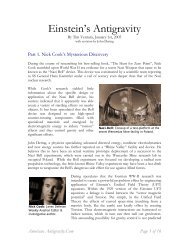A world of connections - Signal Lake Venture Fund
A world of connections - Signal Lake Venture Fund
A world of connections - Signal Lake Venture Fund
Create successful ePaper yourself
Turn your PDF publications into a flip-book with our unique Google optimized e-Paper software.
operators across Europe was so difficult that it decided to make this a business unit<br />
in its own right that supplies access to other M2M sectors.<br />
The biggest obstacle, however, was not technology but the nature <strong>of</strong> the vending<br />
industry. Though the machines are stuffed with well-known brands from large<br />
companies, the firms that manage them are <strong>of</strong>ten small family businesses. Adding<br />
wireless technology means a lot <strong>of</strong> internal changes. What looks like improved<br />
efficiency on paper means a total reorganisation in practice, including job losses.<br />
Paul Green <strong>of</strong> Vianet recalls a conversation with the boss <strong>of</strong> a European vendingmachine<br />
firm who stopped a programme promising cost savings <strong>of</strong> 30% because it<br />
was causing too much disruption.<br />
Nice idea—if someone else pays<br />
Another question that inhibits take-up, even among those who are interested, is who<br />
should pay for the installation. Putting a wireless terminal into a vending machine is<br />
attractive not just for inventory and maintenance but also because it will allow<br />
payment via mobile phone. But it is not clear who should pay, so no one does, says<br />
Anders Franzen <strong>of</strong> Wavecom, which sells cellular modules for machines.<br />
Despite the difficulties, wireless vending machines are starting to emerge, but not in<br />
the way originally envisaged. Machines that sell pricey things such as iPods and<br />
DVDs are now being connected to the internet so companies can gather sales data<br />
and fine-tune the products on <strong>of</strong>fer. Most importantly, the network connection also<br />
handles credit-card transactions, a necessity for higher-value items.<br />
For mobile operators, moving into the M2M market makes perfect sense. It places<br />
low demands on the network. The average traffic load per device is around a quarter<br />
<strong>of</strong> a megabyte per month, estimates Paul Smith, the boss <strong>of</strong> Wyless, an M2M<br />
network provider. And corporate customers stick around for much longer than<br />
individuals do. Yet for customers, adding wireless <strong>connections</strong> to machines is risky<br />
because the technology is evolving so fast. And balancing the interests <strong>of</strong> everyone<br />
who has a stake in the system can be hard.<br />
Certainly the car industry has found it so. Adding wireless features to cars has been<br />
under discussion for years. Some new cars in rich countries now come with satellite<br />
navigation; some have Bluetooth so that mobile phones and digital-media players<br />
can connect with the car's speakers. But long-range, two-way communications are<br />
being introduced only slowly. So far only 15m vehicles <strong>world</strong>wide are connected,<br />
although numbers are expected to grow by 40% a year to more than 60m in 2011,<br />
according to Visant Strategies.<br />
For the moment the technology is being used only in a few luxury cars and some<br />
rented cars and lorries. In Germany, lorries have had a GPS and mobile system to<br />
pay road tolls since 2005. Some regulators require telematics to ensure that lorry<br />
drivers are getting enough rest. Logistics firms themselves use such systems to<br />
communicate with drivers on the road.





